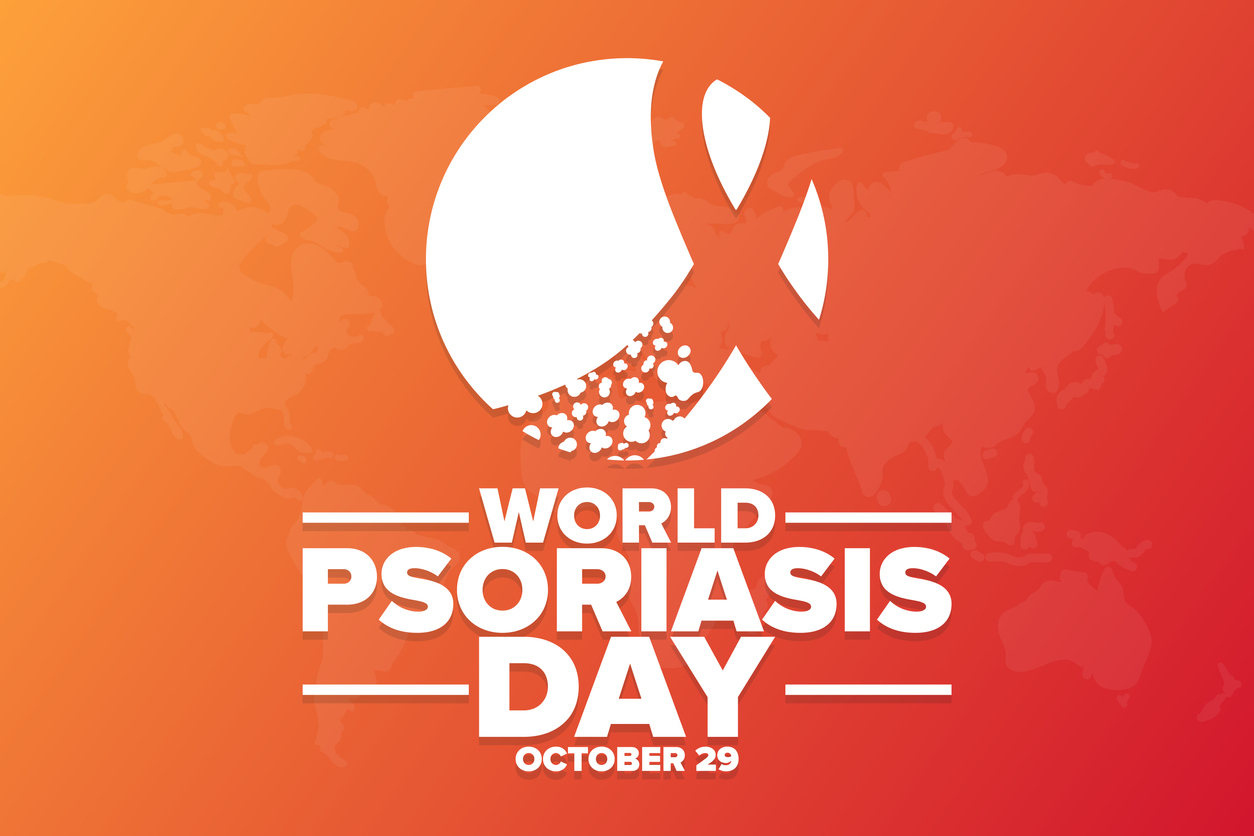Commitment + Clinical Leadership = Better Outcomes

Psoriasis: Facts, Symptoms, & Awareness
Psoriasis is a chronic skin condition caused by the body’s immune system response that results in rashes, scaly skin, and more.
Psoriasis is common, affecting more than 7 million people in the United States.1
Here are some facts about psoriasis, the symptoms, and what you can do this month to help those who have it.
What is Psoriasis?
Psoriasis is an auto-immune condition where the immune system causes inflammation throughout the body.2 Because psoriasis causes the immune system to become more active than normal, there is a rapid growth of skin cells which causes patches and scales to form on the body.
In individuals with psoriasis, the white blood cells mistakenly attack skin cells.1 Normally, white blood cells only attack and destroy bacteria that enter the body in order to fight infection.
Psoriasis typically occurs in cycles with flare ups lasting a few weeks, and then symptoms diminish until the next flare up.
Causes of Psoriasis
The exact cause of psoriasis is unclear, but there have been studies looking to find correlations between the condition and other factors. Researchers have found that genetics and the immune system are the two key factors that contribute to someone developing psoriasis.1
Psoriasis is commonly associated or present with other health conditions, such as heart disease, type 2 diabetes, and inflammatory bowel disease.1
There are also several different types of psoriasis.
- Plaque psoriasis. This is the most common type of psoriasis, and it causes dry, red patches on the skin that lead to scaly plaques.
- Nail psoriasis. Nail psoriasis causes abnormal nail growth and discoloration.
- Guttate psoriasis. This type of psoriasis usually occurs in children and young adults. It’s typically triggered by a bacterial infection and leaves scaling patches on the arms and legs.
- Psoriatic arthritis. Psoriatic arthritis causes swollen joints that are painful. Depending on the severity, the pain can range from mild to severe. Sometimes this type of psoriasis may be the first or only symptom of someone having psoriasis.3
Symptoms of Psoriasis
Symptoms of psoriasis can vary from person to person and will be different depending on the type of psoriasis. According to Mayo Clinic, here are some common symptoms of psoriasis:
- Red patches of skin
- Scaling spots on the skin
- Dry and cracked skin
- Itching or burning on the skin
- Swollen or stiff joints
Patches on the skin and scaly plaques developing are common signs and symptoms of psoriasis. These typically appear on the legs, knees, face, and back.
If you or a loved one experiences any of these symptoms of psoriasis, talk with a doctor.
Treatment for Psoriasis
Although there is no cure for psoriasis, there are different options when it comes to treating it.4 The treatment a doctor recommends is based on the type of psoriasis, the severity of it, and the patient’s personal preference.
Here are a few different options for treating and managing the symptoms of psoriasis:
- Lifestyle changes – Some people try to manage psoriasis flare ups with lifestyle changes such as dieting, avoiding triggers that cause flare ups, and keeping their skin moisturized. Some individuals with psoriasis may find that cutting out certain foods and limiting alcohol intake can help manage or prevent flare ups.
- Medication – There are topical and oral medications available for individuals with psoriasis. There are many over the counter topical treatments that may help mild symptoms, such as inflammation and itching. Doctors are also able to provide patients with a topical or oral prescription when needed.
- Phototherapy – Phototherapy exposes the skin to lights and lasers to slow cell growth and reduce irritation. However, if an individual has a history of other conditions that make them sensitive to light, this is not the best form of treatment.
If you or someone you know has psoriasis, talk with your doctor about other possible treatments.
How to Help Those with Psoriasis
Living with any medical condition or disease can be difficult for individuals and those that surround them.
To help support psoriasis awareness, today and after, there are a few things you can do.
- Spread awareness and share resources. The more that people know about psoriasis, the more you can help dismiss all the myths that surround it. Share articles from credible sources to help spread awareness about psoriasis. There are many sources online that share factual information on psoriasis and go into detail about symptoms. Some trustworthy sources include:
- National Psoriasis Foundation
- Centers for Disease Control and Prevention
- American Academy of Dermatology Association
- Share your story. If you or someone you know has psoriasis, and are open to sharing, speak up. By sharing your own personal experience, it opens the door to conversation and helps people learn about psoriasis and what it’s like to live with it.
- Participate in awareness events. One way you can get involved in helping those with psoriasis is by participating in events designed to spread awareness. The National Psoriasis Foundation hosts virtual and in-person events to help those with psoriasis. Click here to learn about upcoming events and help spread awareness about psoriasis.
- Donate. Monetary donations are a great way to show support and further research. With donations, psoriasis organizations are able to conduct advanced research and potentially find a cure. Here are some organizations you can donate to, if able:
Spread Awareness About Psoriasis
Take the time today to learn more about psoriasis, as well as how you can help those around you who may have it.
Saber Healthcare is an organization dedicated to providing consultant services to long term care providers. This article is for informational purposes and is not meant to be seen as professional advice. Please consult with a medical expert before relying on the information provided.
Sources
- https://www.healthline.com/health/psoriasis.
- https://www.psoriasis.org/about-psoriasis/.
- https://www.mayoclinic.org/diseases-conditions/psoriasis/symptoms-causes/syc-20355840.
- https://www.medicalnewstoday.com/articles/52457.
